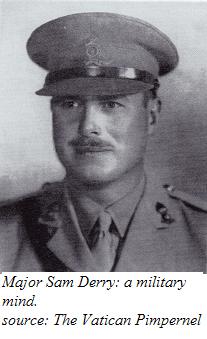Monsignor Hugh O'Flaherty
Narrow Escapes and Escapades.
O’Flaherty wasn’t the only one with stories like that to tell. When SS troops arrived one day for another raid on the Chevalier’s apartment block, the five escapers billeted there had no time to get away. In desperation, they went out onto the balcony and lowered themselves over the edge, clinging to the railings underneath. As it turned out, the troops searched a neighboring apartment, and fortunately never thought to look overhead as they left!And then there was the time when two British Lieutenants were out at the opera with their padrones, Renza and Adrienne Lucidi. Occupying the box next to them was the German general who’d just been appointed Military Governor of Rome. As the opera went on, it became obvious that the General was admiring the beautiful Mrs. Lucidi. Amused, her husband suggested she ask the General for his autograph. She did so, and the delighted General signed his name across her program. The next day, the Lieutenants gleefully brought the paper to the Vatican: an authentic signature from the man who was the absolute top authority in Rome! A legend arose that the organization used this signature on the counterfeit passports that John May (who had photography and forgery on his interesting list of skills) helped provide for refugees. In fact, they simply kept it in case they needed it.
“S. Derry, Major.”
 The organization was obviously the place for people with a bold turn of mind. In late October 1943, another of these showed up. Major Sam Derry of the Royal Artillery had been captured in North Africa, taken to Italy, and put on a prison train heading to Germany. He’d jumped to freedom and headed for the hills, where he found himself in charge of a motley group of POWs about 120 miles behind enemy lines. Since winter was coming on, Derry wrote a letter to the Vatican, asking for money and clothing. A friendly priest took the message, and returned with 3,000 lire and a request that Derry provide a receipt. Derry duly wrote out an acknowledgement of the money, signed it “S. Derry, Major,” and included a p.s. asking for more! These communications reached O’Flaherty, who liked their tone. He and D’Arcy had been looking for someone to bring a little discipline to the growing numbers of escaped soldiers. Derry was brought to Rome in the back of a farmer’s cabbage cart and sneaked into the Vatican—at six-foot-three, he was a good fit for O’Flaherty’s robes. The Monsignor and Sir D’Arcy liked what they saw, and Derry officially became a compatriot.
The organization was obviously the place for people with a bold turn of mind. In late October 1943, another of these showed up. Major Sam Derry of the Royal Artillery had been captured in North Africa, taken to Italy, and put on a prison train heading to Germany. He’d jumped to freedom and headed for the hills, where he found himself in charge of a motley group of POWs about 120 miles behind enemy lines. Since winter was coming on, Derry wrote a letter to the Vatican, asking for money and clothing. A friendly priest took the message, and returned with 3,000 lire and a request that Derry provide a receipt. Derry duly wrote out an acknowledgement of the money, signed it “S. Derry, Major,” and included a p.s. asking for more! These communications reached O’Flaherty, who liked their tone. He and D’Arcy had been looking for someone to bring a little discipline to the growing numbers of escaped soldiers. Derry was brought to Rome in the back of a farmer’s cabbage cart and sneaked into the Vatican—at six-foot-three, he was a good fit for O’Flaherty’s robes. The Monsignor and Sir D’Arcy liked what they saw, and Derry officially became a compatriot. Derry’s military mind brought some order and security to the organization. He started to list names and next-of-kin for the escaped POWs, and to keep track of the money involved. All these important records were stored in cookie tins and buried in the Vatican gardens. Derry set up a chain of communication within the organization, and issued code-names. Sir D’Arcy, for example, was called “Mount,” while Mrs. Chevalier was glamorously known as “Mrs. M.” O’Flaherty got the moniker “Golf.”
Derry eventually became head of a British group that grew out of and worked alongside of O’Flaherty’s organization. While O’Flaherty’s focus had always been humanitarian, the Brits’ aim was to get their men back into active service, and also to gather intelligence on the enemy. The Vatican was willing to overlook many activities on the part of their priests, but spying was not one of them. Derry tried to keep O’Flaherty out of the cloak-and-dagger stuff, but sometimes the monsignor couldn’t resist.